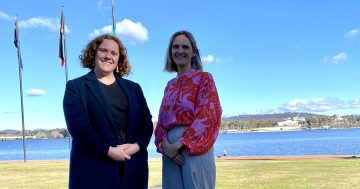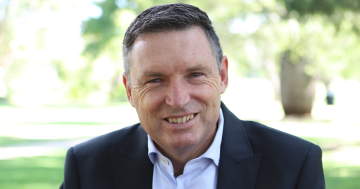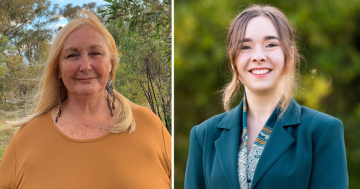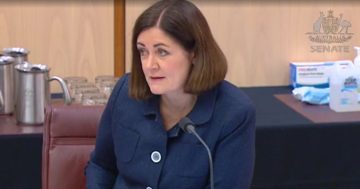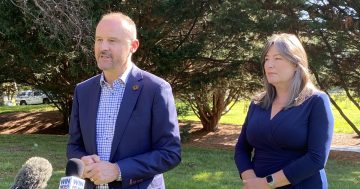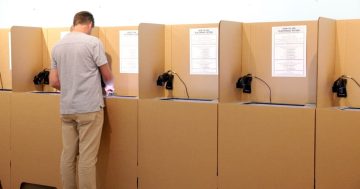In our continuing series of Email Interviews with local candidates in the coming Federal Election we bring you Kerrie Tucker – the ACT Senate Candidate for The Greens.

Kerrie Tucker’s responses, in full and unedited, can be found below:
Q1. Provide a short (no greater and 200 word) employment application style Resume (CV), including what work you have done apart from being a politician or political staffer or party/union/lobby employee and what experience or qualifications do you have with regard to economic management?
Completed Karatane Mothercraft Nursing Training 1968, travelled and worked around Australia for a year or so, working wherever I could, included as cook on fishing boat, bar- work, nursing, farm hand and nanny. Travelled to Europe 1971, varied work in different countries including as waitress, farm hand, bar work, nanny, theatre production assistant, factory work, house maid. Returned to Australia 1974, employment after this included nursing, Field Worker for Family Day Care, farming, journal editor as well as voluntary work with early childhood and environmental organizations.
On economic credentials, in early years raised three children on a very modest income and managed small rural properties. Worked as a volunteer in small organizations –learned about fund raising and more about making every dollar count.. As an MLA in the Legislative Assembly for three terms participated in analysis, debates and committees related to financial management of the Territory, also a Member of the Public Accounts Committee. After resigning from the Assembly in 2004 worked as Executive Officer of ACT Shelter for a time, yet another role that required extremely careful money management, not only to balance the books, but to inspire others to make the most of limited financial resources.
Q2. What would you like to see as the first piece of legislative change brought about by your Government? What are your personal goals for your first year representing the ACT?
If elected, I’d do my best to help foster honest and accountable government through Senate processes. I would like to be part of a Greens balance of power which restored the Senate to its role as a House of Review which examined legislation in detail in collaboration with interested citizens, experts and community groups. I would like to have a role in reinvigorating and cleaning up our democracy, including restoring a frank and fearless public service and improving FOI practice. If I could choose a piece of legislation to get the new government off to a useful start, I’d want to ensure that every piece of legislation include a statement of the net greenhouse gas addition or reduction it would cause, and, if negative,
what the government would do to offset the net increase in emissions.
Q3. What private opinions do you hold which are different to those of your party? On which issues do you disagree with your Party’s stated position?
I agree with Greens policy positions, but also always have the right to vote in accordance with my conscience. I would not hesitate to cast a vote in the Senate differently to one or more of my colleagues if my conscience so dictated. If this occurred, I would fully explain my position to ACT voters and to the ACT Greens members.
Q4. Are you in favour of fixed election terms? Why or why not and if so what length of terms are you in favour of and why?
Yes. Leaving the timing of an election to the discretion of the ruling party promotes uncertainty and game playing in the third year. A four year fixed term would provide clarity and certainty for government, oppositions and Australians. The extra year would allow more time for policy to be prepared, legislated, and bedded down.
Q5. Do you think that it is important for the Prime Minister and their family to live in Canberra? Why or why not?
Yes. Canberra was chosen as the seat of federal democracy for a good reason – to balance the power of the traditionally most powerful states and reassure the other states that they would not be dominated by the big two. It allows the Prime Minister to foster a national focus detached from the intricacies of power in the big states. Thus it has symbolic and practical significance for our democracy.
Q6. Do you consider that making observations about the structure and makeup of the other major political party as beneficial to your own party’s role in the election?
On one level, the structure and makeup of the major parties is a matter for them, however if this structure has a damaging impact on our democracy I think it is valid to make it part of the political debate. It could possibly have a beneficial effect depending on whether people listened and agreed!
Q7. What are your thoughts on the permanent trading of water entitlements, as per the National Water Initiative
(http://www.dpmc.gov.au/water_reform/nwi.cfm), and do you believe that giving water a tradable, economic value is really the best method to ensure that this scarce Australian resource will be utilised sensibly in the future?
Inflows to the Murray Darling inflows are at their lowest in 116 years, and irrigation allocations are at an all time low. We are facing a tragedy for our communities and the environment,
We need immediate action address over-allocation. We need to support landholders and basin communities transition to sustainable enterprises.
The Greens want a ‘ national review of the social, economic and ecological impacts of Australian water allocations and water trading systems’, and a moratorium on the further extension of water trading systems until publication of this review. (See here ). I support this policy.
Q8. Canberra has a large student population and Govt funding per capita for public education facilities seems to be on the slide with there being an apparent shift towards encouraging more people to enter the private education sector. What are your thoughts on this?
What initiatives would you pursue in regard to HECS fees, full fee paying uni courses, increasing/decreasing Austudy payments, funding for education/R&D/communications infrastructure and assistance or encouragement to private sector research and technology companies?
What measures will you take to ensure the best possible education is
available to all Australians?
In Australia we provide a high quality school education system that serves most children well. However, the system is not equitable – it works best for children who are already advantaged and worst for children who are disadvantaged. These are the children who consistently have lower levels of educational achievement than others.
We know the groups of children who most need help – children from low income households, Aboriginal and Torres Strait Islander children, some children who are learning English as a second language and children with disabilities. If we are serious about making education more equitable and lifting levels of educational achievement for all students, funding must be directed to these children.
Also a comprehensive national program to provide free access to quality preschool education for all 3 and 4 year olds would repay the investment many times over.
The Greens’ policy is to ‘abolish fees for educational services at public universities for Australian students, repeal VSU, forgive HECS debts, provide a means tested living allowance for all full-time students and increase funding for research capacity of Australian universities (and) increase the proportion of research funding allocated to research for the public good’.
To scrap HECS and return to a situation where university education is free
for domestic students will cost $2.5 billion each year. To put this in perspective the government’s personal tax cuts from the last two budgets are costing over $15 billion each year, and now an extrs $34b has been promised. So we could all enjoy tax cuts and make university free
Here’s another way to look at it: the Federal Government spent over $9.8 billion in subsidies and tax breaks for the fossil fuel industry in 2005-06 whilst spending less than $5 billion on higher education.
Q9. What is the single most pressing issue in your electorate (local electorate issue – not a broader issue that has an impact on your electorate) and how do you plan on addressing it?
Supporting Canberra, as the National Capital, to lead the way as a sustainable city, with best practice development in the built environment, rigorous protection of the natural environment and support for of our knowledge economy.
Apart from the symbolic importance of the National Capital leading the way, the Federal Government has a particular responsibility to contribute to infrastructure in Canberra. This is because its own planning decisions, such as privatisation of the airport and development of sites around Canberra have huge implications for ACT infrastructure. Also the rising cost of fuel, the need to reduce our greenhouse gas emissions and air pollution, and the disproportionate impact of transport costs on lower income people, who often live the furthest from their workplaces, means local transport must be a priority. .
The planning authorities and planning committees of the ACT Legislative Assembly and Federal Parliament could work collaboratively to improve the current processes and outcomes.
Federal funding should not just be invested in roads, but in rapid transit systems such as light rail. Dispersed employment options are also important and the federal Government can definitely play a role in facilitating this outcome. http://kerrietucker.org.au/2007/11/05/fast-trains-and-light-rail-urgent-action-on-climate-change-and-oil/
Q10. Suppose you and I are stuck in an elevator for 5 minutes. You know nothing about me other than I’m enrolled to vote in your electorate. What do you say to convince me to vote for you?
I doubt that would be the topic of conversation! More likely the mechanics of lifts would be of interest! Or why doesn’t the dam phone work! And then we might talk about Telstra for a while – the 5 minutes would just fly!












